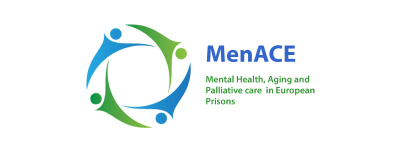
Active Games 4Change
Sport and physical activity learning environment for citizenship, emotional, social and e-competences training

Mental Health, Aging and Palliative Care in Prisons
Portfolio
Project design
IPS_Innovative Prison Systems
Timeframe
11/2016 – 11/2018 (24 months)
Get in touch

Mental health conditions are especially prevalent among the incarcerated population, which presently amounts to about 10 million, worldwide. These mental health issues are exacerbated by age, as over 20% of adults aged 60 and over suffer from a mental or neurological disorder. The number of incarcerated elderly is increasing at an exponential rate: at a rate three times that of the general prison population.
In this context, this project aims to increase the response to mental health disorders within prisons and the quality of palliative and end of life care provided in prisons, by enhancing the competences of management and frontline staff.

Develop pedagogical materials and learning processes that support the training of staff and the training trainers in the field of mental health care and geriatrics in prisons.
Develop and pilot a “train the trainer” course for prison professionals (blended learning) so that they can be able to train continuously their colleagues on mental health care and the needs of older prisoners.
Develop and pilot a training course targeting first line prison administrators and first-line prison staff on basic mental health and age-related health issues.
Develop and pilot a training course targeting first line prison staff on the recognition and prevention of suicides.
Raise awareness within prison staff, prisoners and their families through information and educational materials about mental health issues, and the risk of suicide and self-harm (including awareness of times of risk: when prisoners may be at risk of particular distress and anxiety).
Enhance cooperation with community health care providers and NGOs through referral of mentally ill inmates to local or regional mental health care organisations to ensure access to that can provide further evaluation and treatment after incarceration or during community probation measures.
Raise the awareness of policy makers and judicial staff (namely judges and prosecutors) about the problem of mental health disorders, palliative, end of life care, ageing and its consequences to prison systems.
A training toolkit.
A training guide with detailed competences and skills and indicators (blueprint).
Comprehensive training courses, namely: “mental health and suicide prevention”, “geriatrics in prisons” and “palliative care in prisons”.
A course manual, open-source and usable in all partnership countries' languages.
An e-learning course and a “train the trainer” course.
Five national seminars and an international seminar.
Three short-term transnational staff training courses, involving 24 participants each (one team from each country).

Sport and physical activity learning environment for citizenship, emotional, social and e-competences training

Assessing the Risk of Isolation of Sentenced and Accused: Enhancing the Capacity of Correctional Services to Work with Convicted Children

Cross-sectoral awareness building on mental health needs in the criminal justice system and on release

European Interaction Guidelines for Education Professionals when working with Children in Juvenile Justice Contexts

European Framework of Competences for Community Professionals in Gang Environments

Sentinels of the Future: Together to Eradicate Human Trafficking

Law enforcement and community cooperation and training approach to prevent radicalisation by ensuring refugees’ successful inclusion

Key Competencies for Minor Offender Reintegration

Preventing Emotional and Sexual Abuse Among Young People

Communitarian approach for a holistic young refugee long-term integration

Rehabilitation of foreign inmates within the scope of FD 2008/909/JHA

Restorative and victim-centred approach to mitigate hate and (violent) extremism